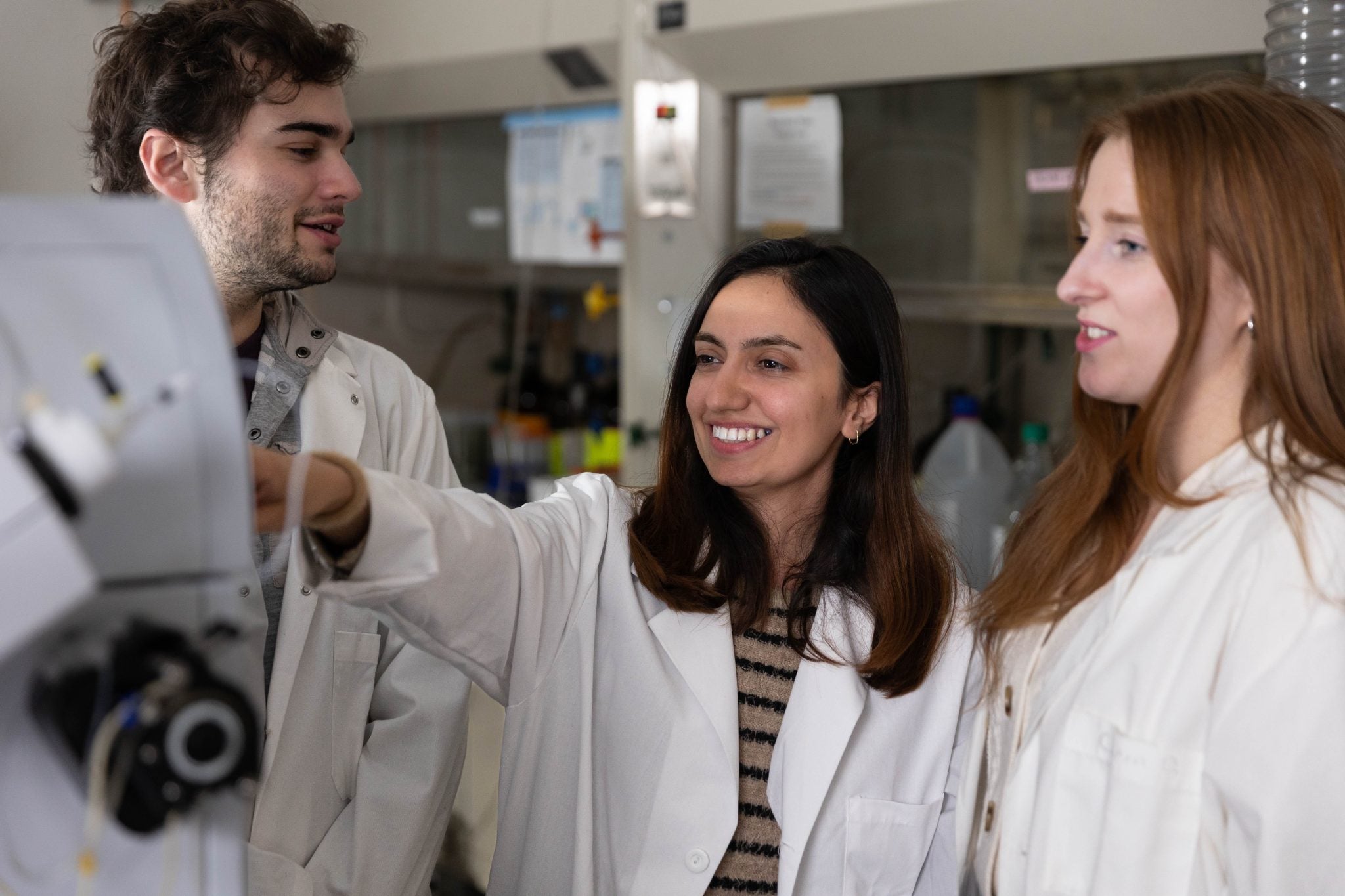Curriculum
Through the MS in Climate, Environment and Health (MS-CEH), health and environment methods are synthesized across all courses, drawing connections between the methods used in these areas of study, so that students understand both the Environment & Health fields and how the methods are applied at the intersection.
The MS-CEH curriculum integrates the scientific methods from Environment & Health as foundational knowledge, supplemented with climate, toxicology and epidemiology. Courses on data visualization, computer modeling and artificial intelligence introduce critical tools. Methods for designing and managing multi-stakeholder problem-solving and policy design processes provide a foundation for leadership. Economics and financing and project and program management provide tools to equip students for career positions.
Faculty members engaged in this interdisciplinary program leverage design-thinking approaches to harmonize content across courses, ensuring pedagogical rigor in each course while integrating learning outcomes across the curriculum. This demanding program offers students an immersive experience that combines rigorous theoretical coursework with practical, hands-on learning experiences. By focusing on real-world skills and interdisciplinary approaches, the program prepares graduates to excel in their fields within a condensed time frame.
Summer Intensive
The program begins with an intensive 3-week Summer session in early August.
More on the capstoneFall Semester
The Fall lays the foundation for a theory-to-practice approach. Backed by environmental and health sciences, students will learn to support stakeholders in designing strategies for climate-driven adaptation and resilience. Then, students will learn to guide stakeholders in creating programs and projects, including budgeting, implementation, and evaluation.
Spring Semester
In the Spring, students will further develop skills and gain the expertise required for technical, government, and private sector careers. For instance, the Data Analysis and Visualization course will expose students to numerous software applications and equip them with the skills needed for very technical jobs. This technical skills-building will be complemented by courses around policy design, climate science, and in-depth exploration of toxicology and exposure assessment. The Capstone during this semester serves as a culminating, practical-application project that will enable students to apply the knowledge and skills they have acquired throughout the year, with a focus on skill development and application, and cultural sensitivity.
Curriculum at a Glance
| Summer Intensive (Early August Start) | Number of Credits |
|---|---|
| Resolving Complex Public Problems in Environment and Health | 3 |
| Geographic Information Systems (GIS) | 1.5 |
| Fall Semester | Number of Credits |
|---|---|
| Health for All: Epidemiology and Biostatistics | 3 |
| Environmental Foundations and Challenges | 3 |
| Environmental Health Economics and Financing | 3 |
Program and Project Design, Budgeting, Implementation, and Evaluation | 3 |
| Co-curricular Portfolio Design: Career Pathway | Non-Credit Bearing |
| Spring Semester | Number of Credits |
|---|---|
| Data Analysis and Visualization (various software) | 3 |
| Global Climate and Health Policy | 3 |
| Climate Science | 3 |
| Toxicology and Exposure Assessment in a Changing Climate | 3 |
| Capstone Preparation & Implementation | 1.5 |
Summer Intensive
Resolving Complex Public Problems in Environment and Health: To set students’ foundation in problem-solving, an immersive course will take place in the classroom as well as at field sites in Chincoteague, Virginia during the week prior to the fall semester. This foundational course introduces students to analysis, intervention design, stakeholder management and resolution in the context of resource management, adaptation and mitigation of climate change. Contexts range from resolving conflict through cross-sector collaboration to forward-looking co-creation processes where community members are already fully engaged as core stakeholders. Cutting-edge application at the intersection of climate, health and the environment will focus on areas such as disaster mitigation and adaptation around human and animal migration, food security, water and waste management and natural disaster. This immersive experience will acclimate students to a real context in which climate and environmental change jeopardize health outcomes. In their first experience in the program, students will learn about the complex problems facing Chincoteague and its surrounding area and co-develop projects with community members.
Geographic Information Systems (GIS): Students will learn the theory, tools, and techniques used to capture, analyze, and visualize geographic data. GIS is a combination of cartography and data analysis that uses location technology to create data-driven graphics. Case studies will synthesize environment and health with a focus on data drawn from those sectors as well as others relevant to the environmental challenges and health for all courses. Additionally, this course will teach students to appropriately convey their data findings to leaders in various sectors and disciplines who possess varying degrees of expertise at the intersection of climate, environment, and health.
Fall Semester
Health for All Epidemiology and Biostatistics: equips students with critical thinking and quantitative skills to investigate urgent environmental health questions using real-world data. Students learn to interpret and evaluate scientific findings in both academic and popular media, work hands-on with publicly available datasets, and develop original population health research questions and methods. The course introduces coding in the statistical programming language SAS and emphasizes interdisciplinary approaches central to environmental epidemiology. As a level-up course, it focuses on how human health patterns across diverse socio-demographic groups evolve in response to climate change, preparing students for academic and professional pathways in environmental health and related fields.
Environmental Foundations and Challenges: This course introduces global environmental challenges through natural and social science perspectives, examining how human activity affects the ocean, land, and atmosphere. Students build foundational knowledge on issues such as climate change, sea level rise, wildfires, biodiversity loss, air pollution, and synthetic chemicals (PFAS), while exploring science-based solutions. The course also examines how environmental change affects human well-being, addressing concepts such as environmental anxiety, grief, and resilience to prepare students for sustained engagement with environmental challenges.
Environmental and Health Economics and Financing: This course consists of two components. In the first part of the course, Environmental Health Economics, students will explore the economic aspects of human health in relation to the environment. The primary focus is on understanding the economic implications of the environment-health connection in policy development. This includes learning how to quantify the environmental impact on human health, both in monetary terms (using Cost-Benefit Analysis) and non-monetary terms (using Cost-Effectiveness Analysis). In the second part of the course, Environmental Health Financing, students will examine how to finance environmental and health interventions aimed at reducing health risks. Key focus areas include extreme weather events, temperature extremes, air pollution, and vector-borne diseases.
Program and Project Design, Budgeting, Implementation, and Evaluation: Students will gain a thorough understanding of how to practically apply project management concepts that will equip them to effectively and successfully design, plan, manage, close out, and evaluate climate change, health and environmental projects. This class will explore pipelines of multilateral, regional and bi-lateral funding for climate, environmental and health projects with the goals of making vulnerable populations more resilient, stronger and healthier in changing environmental surroundings and a changing climate. Through informative content, hands-on activities, class discussions, and a threaded case study, students will explore the tools, techniques, and working practices associated with successful project management. This comprehensive foundational course focuses on the project management principles aligned with A Guide to the Project Management Body of Knowledge (PMBOK® Guide) and many of the Government Accountability Office (GAO) guides.
Portfolio Design Career Pathway: This non-credit bearing project will be woven throughout the curriculum to equip MS-CEH students with a deliverable to supplement their CV/resume. This portfolio could take on multiple short-form non-academic writing or audiovisual formats, including a case study synthesis report, policy brief, GIS report, complex problems infographic, or any of the variety of audiovisual options that will . The MS-CEH Program Academic Program Director (FTNTL) will oversee this project.
Spring Semester
Data Analysis and Visualization (various software): This course equips students with the skills to communicate complex climate, environmental, and health data clearly and effectively. Students learn to create charts, graphs, maps, and other visual tools to identify trends and patterns and tell compelling, accessible data-driven stories. The course introduces core data science concepts and software such as R and social network analysis tools, emphasizing how to synthesize complex datasets and present technical results in engaging, audience-centered ways that support understanding and emotional resilience
Global Climate and Health Policy: This comprehensive compressed course provides an in-depth understanding of international organizations and the legal structures that govern climate and health policies. Students will learn to design and negotiate policies and participate in numerous simulations to practice applying their theoretical knowledge in an engaging context. Students will understand how to influence the interplay between global climate and health policies, national public health outcomes, and governmental and non-governmental organizations aiming to strengthen their engagement in climate and health. The course will address the achievements and shortcomings of global climate and environmental and health governance, and how they affect health outcomes from the community level to the international scale. Through this course, students will be provided opportunities to showcase their learnings via various communication mediums that effectively combine theory and practice.
Climate Science: This course will offer students foundational knowledge about the Earth’s climate and how it affects the planet’s atmosphere and ecosystems, and therefore public health. Topics include climate change: how it is important and how it will impact people around the world; climate data: how to analyze and interpret climate data to develop responses and plans to address climate challenges; climate cycles: how science describes the major forces, cycles, and oscillations that create climate at local, regional, and global levels. Students will study changes in climate over geological and historic time, and discuss trends, the impacts on biodiversity and humans, and the role of the ocean and land surface in climate. Students will gain an understanding on how shifts in temperature and rainfall patterns, extreme weather events and other climatic changes impact ecosystems and human health.
Toxicology and Exposure Assessment in a Changing Climate: This course integrates the principles of toxicology and exposure science to provide a thorough understanding of how hazardous agents impact human health, including risk assessment, management and communication. The course covers both how toxicants cause cellular and organ damage and how to assess and control exposure to these hazards in occupational, residential, and ambient environmental settings. Students will learn how chemicals, pollutants, and biological hazards in air, water, soil, and consumer products differentially impact health through various exposure pathways. Through a combination of lectures and student-led discussions, students will be trained to assess exposure data and interpret toxicological findings.
Capstone Preparation & Implementation: The 12-week Capstone Course provides cohorts of 2-5 students with a theory-based practical experience to apply their understanding of Environment & Health challenges in an organizational setting. Working in teams, students will be placed in an organization to conduct field research, or develop or implement a program or project. There is a focus on vulnerable populations affected by a changing climate. Key competencies for identifying opportunities and resolving environmental challenges impacting health include: leveraging business, project implementation, problem-solving, analytical, and synthesis skills, and effective communication. Students will present their Capstone findings in May.




